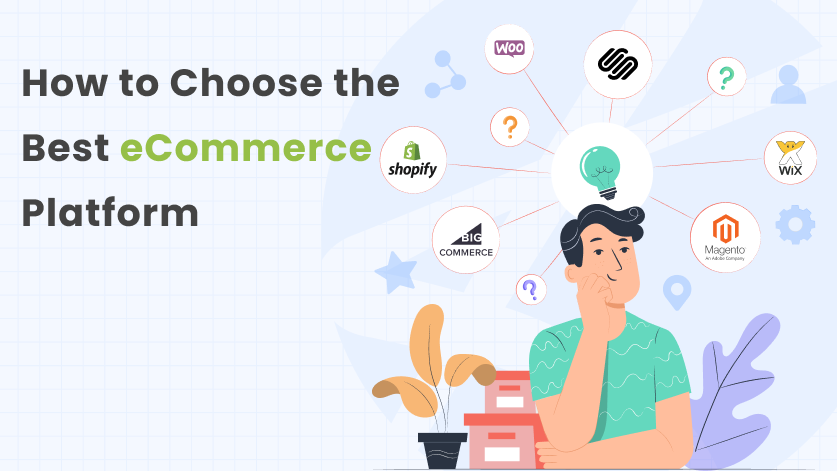Online presence is a necessity for any business in the current digital era. Having the best platform for eCommerce websites makes it easy and effective to sell products and services to customers all over the world, whether you run a small business or a large company.
But because there are so many options, it can take time to find the best online web store builder for your business.
When choosing the best platform for eCommerce websites, it’s important to think about the type, size, and industry of your business.
Different kinds of businesses need their eCommerce platforms to have different kinds of features and functions.
For example: A business-to-business (B2B) company may need advanced tools for managing inventory and options for wholesale pricing. A business-to-consumer (B2C) company, on the other hand, may need strong marketing and customer engagement tools.
In this article, we will go over the most important factors to consider while choosing the best eCommerce platform. The importance of an eCommerce website lies in its ability to reach a global audience, provide a convenient shopping experience, and increase sales for online businesses of all sizes.
These factors include features, price, integration, and ability to grow with your business. If you are aware of these factors, you can easily choose the best platform for your business that meets your needs and helps you reach your target sales.
Also Check: ThriveDesk – The Best eCommerce Customer Support System
When to Invest in an eCommerce Platform?
Investing in an eCommerce platform requires a huge amount of money, time, and effort. Before choosing an eCommerce platform, make sure you are making the right decision as a business owner.
In this section, we’ll use data-driven insights to help you decide when it’s time to invest in an eCommerce platform.
1. Your Business is Expanding:
As your business experiences rapid growth, it becomes apparent that utilizing leading eCommerce platforms is imperative.
Adopting the best eCommerce platform can aid you in managing your business operations, enhancing the customer experience, and coping with increased demand.
With 56% of consumers indicating a preference for online shopping, implementing an eCommerce platform can expand your reach and engage with more potential customers.
2. Taking Care of Customers’ Needs:
A crucial aspect to consider when contemplating the investment in an eCommerce platform is the degree to which it can meet your customers’ requirements.
These platforms are tailored to facilitate a smooth and hassle-free shopping experience, enabling customers to purchase products or services conveniently.
An adept eCommerce platform may present an array of payment options, shipping methods, and other features that augment the overall customer experience.
A survey found that 59% of shoppers are likelier to buy from a brand that offers more than one way to buy, such as an eCommerce platform.
3. You want to make more money:
It is a commonly known fact that investing in an eCommerce platform can significantly increase your revenue. By venturing into online sales, you can reach out to a vast customer base who might not have been able to access your products otherwise.
With the aid of a suitable platform, you can broaden your customer base, simplify the sales process, and offer a more hassle-free shopping experience to your patrons.
4. You want to reach more users:
With an eCommerce platform, you can reach more customers or users around the world. 57% of online shoppers around the world have made at least one online purchase from a company in another country in the last 12 months.
With an eCommerce platform, you can sell your goods or services across the country or even the world.
How to Choose the Best Platform for eCommerce?
To make sure your business does well online, you need to choose the right eCommerce platform. When there are so many choices on the market, it can take time to choose the best one.
Here, we’ll show you how to choose the best platform for an eCommerce website, step by step.
Step #1: Identify your Business Requirements:
First, you need to figure out what your business needs. Think about how much money you have, how big your business is, and how many products you sell. Think about the most important features you need, like payment processing, managing your inventory, shipping, and analytics.
Step #2: Look and Compare Different Online Shopping Platforms:
Once you know your business needs, you can look into and compare the best eCommerce platforms on the market. Look for platforms that have all of the above essential eCommerce features. Check out their pricing, review, user interface, options for customization, and customer service.
Step #3: Check and See if it Fits your Business:
Ensure that the eCommerce platform you choose will work with how you run your business. Check the payment process that works for you, shipping companies, and any other business software you use.
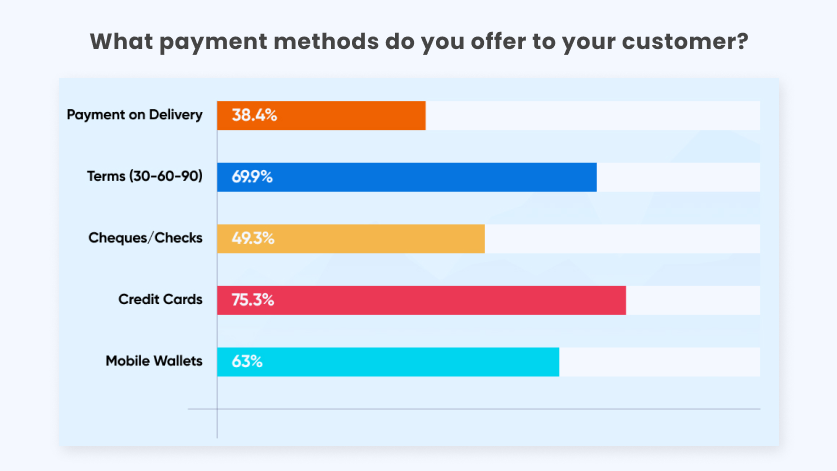
Step #4: Look for Scalable Options:
Consider how your business can grow in the future and choose the best platform for your eCommerce business with growth potential. As your business expands, look for platforms that allow you to add more products, integrate new software, and handle more traffic.
Step #5: Find out How Well your Website Works on a Mobile Device:
In today’s mobile-driven world, it is important to choose the best platform for an eCommerce website that is both mobile-friendly and responsive. Check if the platform has features to ensure your store looks good and works well on mobile devices.
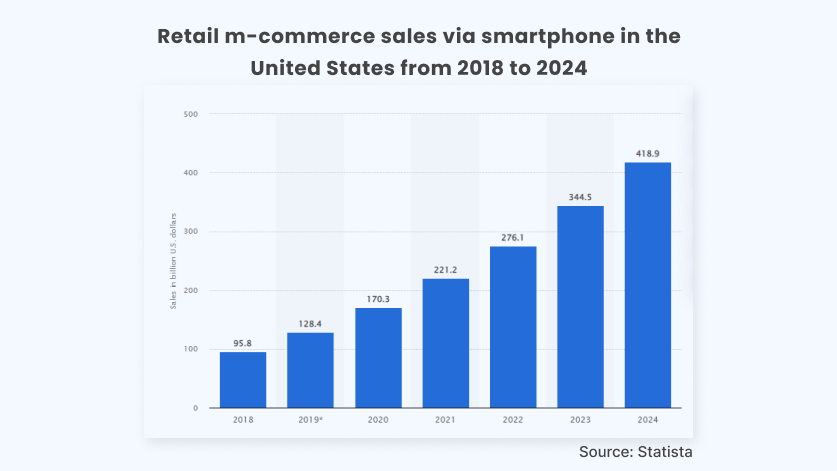
When choosing the top eCommerce platforms, security is another important thing to think about. Look for platforms with SSL certificates, password protection, and PCI compliance to ensure your customers’ data is safe and secure.
Types of eCommerce Platforms: Self-Hosted vs. Cloud-Based
One of the most important decisions you’ll have to make when setting up an online store is which eCommerce platform to use.
There are two main types of eCommerce platforms:
- Self-hosted eCommerce Platforms
- Cloud-based eCommerce Platforms
Here, we’ll look at both kinds of eCommerce platforms and compare their pros and cons.
Self-hosted eCommerce Platforms:
Self-hosted eCommerce platforms are ones that you host on your own server and are in charge of maintaining. This means you have more control over how secure, up, and scalable your website is.
You can also make it easier to grow your site and choose who will host it. But this means you have to pay for hosting and a domain name and learn more about technology.
One of the best things about self-hosting your eCommerce site is that you have full control over it. You can make your site look the way you want and add any features you want.
You also have more control over how well your site works because you can tweak your server to give your customers the best experience possible.
Self-hosting, on the other hand, requires more technical knowledge, and you have to make sure that your server is always up and safe.
You’ll also need to be ready to deal with any technical problems that come up since you won’t be able to rely on a platform provider.
Cloud-based eCommerce Platforms:
Cloud-based eCommerce platforms are hosted by the platform provider, so you don’t have to worry about server maintenance. This gives you more time and money to put toward growing your business.
You also get more features and help from the platform provider, which can be helpful if you need to be tech-savvy. Cloud-based platforms do have some problems, though.
You don’t have as much control over your site, so you might need help to make it look the way you want. This can be a problem if your site gets a lot of visitors all at once or if you need to add new features quickly.
With a self-hosted platform, you may also need help making your site as easy to grow as possible.
Cost is another thing to think about. Most cloud-based platforms charge a fee every month, and you also need to buy a domain name. Even though this cost isn’t too high, it can add up over time, especially if you’re just getting started.
Top eCommerce Platforms:
When it comes to creating an online store, choosing the right eCommerce platform is important. With so many options available, it can be overwhelming to choose which one is best for your business.
Here, we’ll be discussing the top eCommerce platforms and what makes them stand out.
1. Shopify:

First up, we have Shopify. This popular platform has been around since 2004 and is known for its ease of use and flexibility. With Shopify, you can create a professional-looking online store in just a few clicks.
It also offers many features, including a built-in payment system, customizable themes, and powerful analytics.
One of the biggest benefits of using Shopify is its extensive Shopify app store. With thousands of apps available, you can add new functionality to your store and customize it to your content.
However, Shopify can be a bit expensive compared to other platforms, especially if you need multiple apps to get the desired features.
Pros:
- Easy to use
- Lots of features and customization options
- Great support and resources
- High-quality security
Cons:
- It can be expensive, especially with add-ons
- Limited design flexibility compared to some other platforms
- Transaction fees for using external payment gateways
If you’re considering Shopify, it’s worth comparing it to other popular eCommerce platforms.
For example: WooCommerce is a free plugin for WordPress that offers many customization options and a low barrier to entry. BigCommerce is another popular platform that offers a wide range of features and customization options, although it can be expensive for larger businesses.
2. WooCommerce:
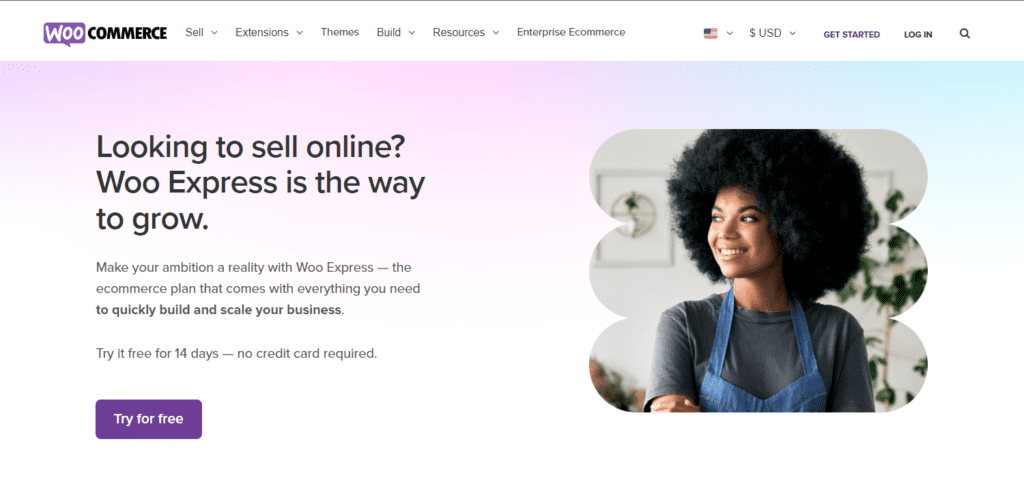
WooCommerce is a popular eCommerce platform that is built on WordPress. It is a free plugin that can be easily installed on any WordPress site, making it a popular choice for small businesses and individuals looking to set up an online store.
One of the biggest benefits of using WooCommerce is its flexibility. Because it is built on WordPress, you have access to thousands of plugins and themes that can be used to customize your store.
This means you can create a unique and personalized shopping experience for your customers.
In addition, WooCommerce is very user-friendly. The setup process is straightforward, and many tutorials and resources are available to help you get started.
The platform offers many features, including built-in payment processing, shipping options, and tax management.
However, one downside to using WooCommerce is that it can be resource-intensive. Because it is built on WordPress, it requires many server resources to run smoothly.
This can be a problem for businesses with high traffic volumes or limited server resources.
Pros:
- Free to use (although you will need to pay for hosting and other related costs)
- Highly customizable
- User-friendly
- Lots of integrations with third-party tools and services
Cons:
- It can be resource-intensive, which can slow down your site
- Limited support options (although there are many online resources available)
- Security vulnerabilities can occur due to WordPress plugin vulnerabilities
Overall, WooCommerce is a great choice for small businesses and individuals looking to create an online store. It offers many flexibility and customization options and is easy to use.
However, it may not be the best choice for larger businesses or those with high traffic volumes.
3. Magento:
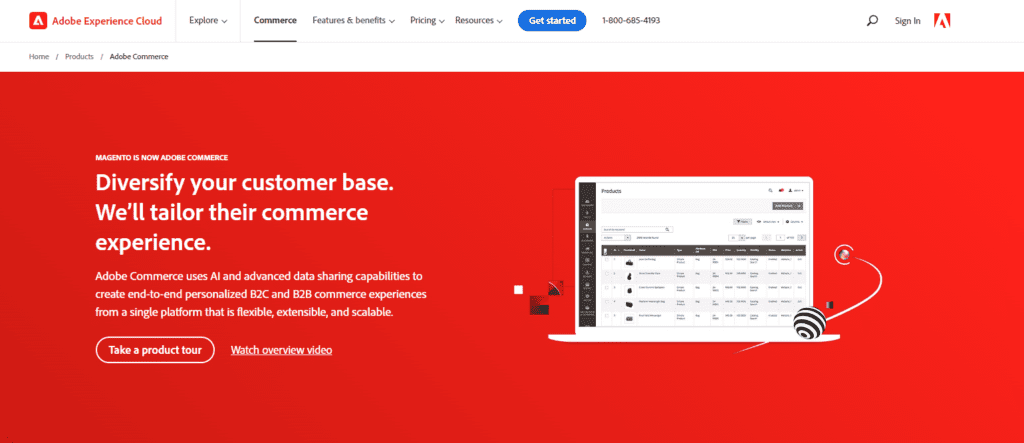
Magento (Adobe Commerce) is a powerful and feature-rich eCommerce platform popular among large and enterprise-level organizations.
It offers a wide range of features and customization options, making it a popular choice for businesses requiring high flexibility and scalability.
One of the biggest benefits of using Magento is its extensive feature set. It offers many built-in features, including advanced inventory management, robust shipping and tax options, and powerful analytics and reporting.
In addition, it has a massive library of third-party extensions and plugins that can add even more functionality to your store.
Another benefit of Magento is its scalability. It is designed to handle high traffic levels and can easily support large product catalogs.
This makes it a great choice for businesses looking to grow and expand their online presence.
However, one downside to using Magento is its complexity. Because it offers so many features and customization options, it can be overwhelming to set up and manage.
In addition, it can be resource-intensive and requires a lot of server resources to run smoothly.
Pros:
- The extensive feature set, including advanced inventory management and reporting options
- Scalability, making it a good choice for large businesses
- Large library of third-party extensions, modules, and plugins
- Highly customizable
Cons:
- Complexity, which can make it difficult to set up and manage
- Resource-intensive, which can require more server resources and increase hosting costs
- Limited support options for the free version of the platform
Magento is a powerful and flexible eCommerce platform well-suited for large and enterprise-level organizations.
While it can be complex to set up and manage, it offers many features and customization options to help businesses grow and succeed online.
4. BigCommerce:
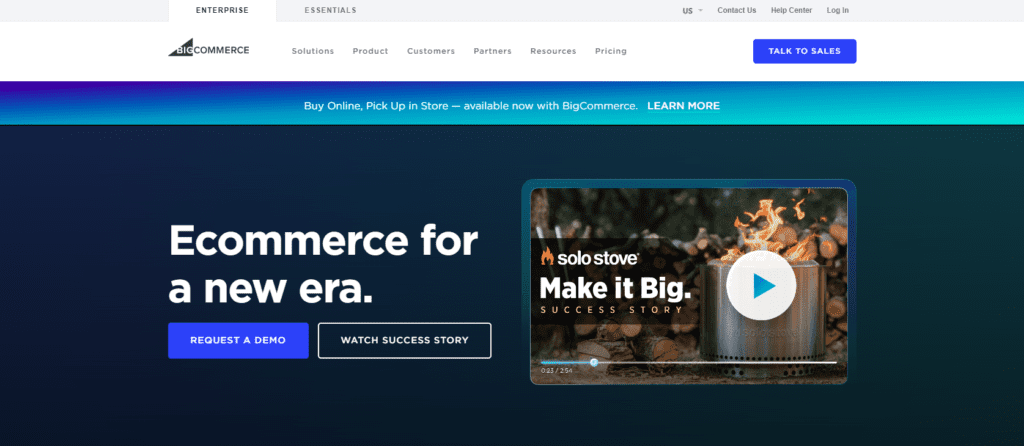
BigCommerce is a SaaS-based eCommerce platform founded in 2009. It enables businesses of all sizes to build, launch, and grow their online stores.
BigCommerce boasts an extensive range of features, making it an ideal platform for businesses looking to sell online.
One of the significant benefits of BigCommerce is its scalability. It can accommodate businesses of all sizes, from small startups to large enterprises.
Additionally, it offers a wide range of customizable templates and themes, making it easier for businesses to create a unique online store that aligns with their brand identity.
Pros:
- User-friendly interface
- Seamless integrations with third-party apps
- Excellent customer support
- No transaction fees
- Multi-channel selling capabilities
Cons:
- Limited free themes
- The steep learning curve for some features
- Limited customization options for the checkout page
- Limited in-house payment processing
When compared to other eCommerce platforms like Shopify and WooCommerce, BigCommerce offers more advanced features out of the box.
BigCommerce emerges as a powerful option for businesses seeking a scalable and secure platform with robust customization capabilities.
For businesses specifically focused on B2B eCommerce, consider integrating your BigCommerce store with BundleB2B. It allows you to streamline your B2B operations and provide a smoother buying experience for your customers.
However, it may not be the best option for businesses with a limited budget, as its pricing plans can be more expensive than its competitors.
5. Squarespace:

Squarespace is a cloud-based eCommerce platform founded in 2003. It allows businesses to easily create websites, online stores, and blogs.
Squarespace is an all-in-one platform offering a range of features that make it an ideal choice for businesses selling products or services online.
One of the significant benefits of Squarespace is its user-friendly interface. It enables businesses to create beautiful and professional-looking websites without requiring any technical knowledge.
Additionally, Squarespace offers a range of customizable templates and themes that enable businesses to create a unique online store that aligns with their brand identity.
Pros:
- Beautiful and customizable templates
- Secure payment processing
- In-built blogging platform
- Excellent customer support
- Mobile-responsive designs
- No transaction fees
Cons:
- Limited payment gateways
- Limited customization options for the checkout page
Squarespace is an excellent eCommerce platform for businesses seeking a user-friendly platform with beautiful and customizable templates.
However, it may not be the best option for businesses with large inventories or requiring advanced inventory management features.
6. Wix:

Wix is a cloud-based website builder founded in 2006. It enables businesses to create beautiful and professional-looking websites and online stores without requiring any coding knowledge.
Wix offers a range of features that make it an ideal choice for businesses selling products or services online.
One of the significant benefits of Wix is its ease of use. It offers a user-friendly drag-and-drop interface that enables businesses to create stunning websites without requiring any technical knowledge.
Additionally, Wix offers a range of customizable templates and themes that allow businesses to create a unique online store that aligns with their brand identity.
Pros:
- User-friendly interface
- Mobile-responsive designs
- Wide range of customizable templates and themes
- Secure payment processing
- Excellent customer support
Cons:
- Limited customization options for the checkout page
- Limited payment gateways
- Limited advanced inventory management features
Compared to other eCommerce platforms like Shopify and BigCommerce, Wix offers a more straightforward and user-friendly interface. However, it may not be the best option for businesses with large inventories, as it lacks some advanced inventory management features.
If you’re not ready to create a separate website, you can begin on marketplaces with existing traffic, like Amazon, one of the largest platforms for sellers.
What is the Best Platform for an eCommerce Website Overall?
Shopify is one of the best platforms for eCommerce websites overall for various reasons:
- User-Friendly Interface: Shopify has an easy-to-use interface that even beginners can understand. Its drag-and-drop website builder makes it easy for people who don’t know how to code to customize their online stores.
- Wide Range of Features: Shopify has many features, such as tools for managing inventory, product variants, orders, customers, and marketing.
- Scalability: Shopify works for businesses of all sizes, from small startups to large enterprises. It has different plans, so businesses can move up or down as needed.
- Payment Integration: Shopify works with over 100 payment gateways, like PayPal, Stripe, and Apple Pay, so it’s easy for customers to buy things and for businesses to get paid.
- Mobile Responsiveness: Shopify has responsive design templates that work well on phones and tablets. This makes it easy for customers to get to online stores and move around on their phones and tablets.
- Security: Shopify is a safe platform that uses SSL encryption to protect sensitive information, like customer and payment information.
- Integration with Third-Party apps: Shopify works with more than 3,000+ third-party apps, which lets businesses add more features to their online stores.
What is the Best eCommerce Platform for Small Businesses?
WooCommerce is a great choice for small businesses that want to sell things online. WordPress is a popular content management system that is used by millions of websites around the world. WooCommerce is a plugin for WordPress.
Here are some reasons why small businesses should choose WooCommerce:
- Easy-to-use: WooCommerce is easy to set up and use, even for people who don’t know how to code. The platform has an easy-to-use interface and a lot of ways to customize it, so it’s easy for small businesses to make an online store that fits their needs.
- Low Cost: WooCommerce is free, but businesses have to pay for hosting and domain name registration. But compared to other eCommerce platforms, the costs of running a WooCommerce store are pretty low.
- Customizability: WooCommerce is very easy to change because it is a plugin for WordPress. Users can choose from a wide range of plugins and themes to make a unique online store.
- SEO-Friendly: WooCommerce is SEO-friendly, which means that businesses can improve their online visibility by making their online store better for search engines.
- Community: WooCommerce has a large community of users who share tips, tricks, and the best ways to use the platform all the time. This help from the community can be very helpful for small businesses that need more money to hire a full-time eCommerce expert.
Additionally, businesses should know that Shopify is a great eCommerce platform. Shopify has a lot to offer, and WooCommerce, has an easy-to-use interface, the ability to make changes, and community support.
But the pricing plans for Shopify may be more expensive than those for running a WooCommerce store.
In the end, a small business’s choice between WooCommerce and Shopify will depend on its needs, budget, and technical knowledge.
What is the Best eCommerce Platform for Startups?
BigCommerce is thought to be one of the best platforms for eCommerce websites for startups.
These are some reasons why BigCommerce:
- Scalability: BigCommerce is designed to be scalable, which means it can grow as a startup does. This makes it a great choice for startups that want to grow their online presence quickly.
- Features: BigCommerce has a lot of features, including inventory management, order management, shipping and tax calculations, and different payment options. This helps startups run their online stores more efficiently and effectively.
- Customizability: BigCommerce has a lot of ways to change things, so startups can make online stores that are unique, interesting, and reflect their brand.
- Security: BigCommerce takes security seriously and has industry-leading security features to protect businesses and customers.
- Support: BigCommerce offers phone, email, and live chat support all the time. This kind of help can be very helpful for startups that might need more money to hire eCommerce experts.
- Growth Potential: BigCommerce is an effective platform for startups that want to grow their online sales. According to a study by Ipsos, BigCommerce merchants grow by 28% each year, which is almost twice as fast as the industry average.
- ROI: A study by Forrester Consulting found that BigCommerce provides “strong performance”. This makes it a very effective platform for startups that want to grow their income
What is the Best eCommerce platform for SEO?
WooCommerce is thought to be one of the best eCommerce platforms for SEO (Search Engine Optimization).
Here are some reasons why WooCommerce:
- WooCommerce is built on WordPress: WordPress is one of the best content management systems for SEO. This means that WooCommerce gets many of the SEO benefits of WordPress, like clean code, easy customization, and a large number of SEO plugins.
- SEO Plugins: WooCommerce has a number of SEO plugins, such as Yoast SEO and All in One SEO Pack, that help businesses optimize their online store for search engines. These plugins let you optimize keywords, change meta-tags, and make a sitemap.
- Mobile Responsiveness: Mobile responsiveness is now an important ranking factor for Google. WooCommerce has mobile-friendly responsive design templates that help businesses rank higher in mobile search results.
- Site Speed: The speed of a site is also a factor that search engines use to rank sites. The light code and caching options of WooCommerce help to speed up sites and improve their search engine rankings.
- Community Support: WooCommerce has a large community of users who share tips and best practices for SEO-optimizing online stores. This help from the community can be very helpful for businesses that need more money to hire a full-time SEO expert.
Squarespace is also a good platform for SEO when it comes to eCommerce. Squarespace has many SEO features, such as clean code, customizable meta tags, and design templates that work well on mobile devices.
It is a more secure platform and gives you more ways to customize and be flexible than WooCommerce.
What is the Best eCommerce Platform for B2B?
One of the best platforms for an eCommerce website for B2B (Business-to-Business) transactions is Magento/Adobe Commerce.
Here are a few reasons why Magento:
- Customizability: Magento and Adobe Commerce can be changed in a lot of ways, so businesses can make B2B online stores that are unique and complex. A study by Forrester Consulting found that websites with Adobe Commerce saw an average return on investment of 242%.
- B2B Features: Magento/Adobe Commerce has a number of B2B features, such as personalized catalogs, complex pricing structures, customer-specific discounts, and a streamlined checkout process. These features make it easier for B2B companies to manage their sales and build better relationships with their customers.
- Scalability: The Magento/Adobe Commerce platform is very scalable, which means that it can grow as a B2B business does. It’s a great choice for B2B businesses that want to grow their online presence.
- Security: Magento/Adobe Commerce takes security seriously and offers a number of security features to protect businesses and customers. This is especially important for B2B businesses dealing with sensitive customer information and transactions.
Other top eCommerce platforms for B2B businesses are Shopify Plus and BigCommerce B2B Edition. Shopify Plus has more advanced features like the ability to sell on more than one channel at once, wholesale channels, and integrations that are made just for you.
BigCommerce B2B Edition, on the other hand, has price lists, customer groups, and several shipping and payment options. But Magento/Adobe Commerce is still the best choice for B2B businesses because it is highly customizable, has a wide range of B2B features, can be scaled up, and is safe.
Which is the Best eCommerce Platform for Dropshipping?
WooCommerce, Shopify, and Wix are three of the top eCommerce platforms that can be used for dropshipping. Each platform has its own pros and cons, so it’s important to think about your needs before making a choice.
- Drop shippers like WooCommerce because it’s free to use and gives them a lot of options. With WooCommerce, you can change the look and feel of your store to fit your needs. There are also a lot of plugins you can use to manage your store and make your work easier. WooCommerce, on the other hand, requires some technical knowledge and costs money for hosting and other services.
- Shopify is a great choice for drop shippers because it’s easy to use and has many features that can help you run your business more smoothly. With Shopify, you can pick from different templates and change the look of your store to fit your brand. You can also add things like product reviews, integration with social media, and the ability to recover an abandoned shopping cart. Shopify, on the other hand, can be more expensive than other platforms, especially if you need to use paid apps or features.
- Wix has a cheap and easy-to-use eCommerce platform, which makes it a great choice for drop shippers who are just getting started. With Wix, you can choose from different templates and change the design of your store to fit your brand. You can also add things like product reviews, integration with social media, and the ability to recover an abandoned shopping cart. Wix, on the other hand, has fewer options for customization than other platforms and can be less flexible when it comes to SEO and other technical things.
Shopify is the most popular platform for drop shippers, with over 1 million businesses using it. WooCommerce is also popular, with more than 4 million installations that are still running. Wix is a newer platform, but it has over 180 million users around the world and is growing quickly.
Conclusion:
In conclusion, choosing the best platform for an eCommerce website for your business can be hard. With so many choices, it’s important to consider your needs and budget before deciding.
Even though every platform has its pros and cons, Shopify stands out as the best choice for most eCommerce businesses based on statistics and features.
It has many features, is easy to use, and is used by many people. But you should think carefully about all your choices before making a final choice.
Feel free to contact us if you have any questions or need help choosing the best platform for your business. Our team is always here to help you figure out what to do.
Which eCommerce platform do you use to run your online store? Comment below!








